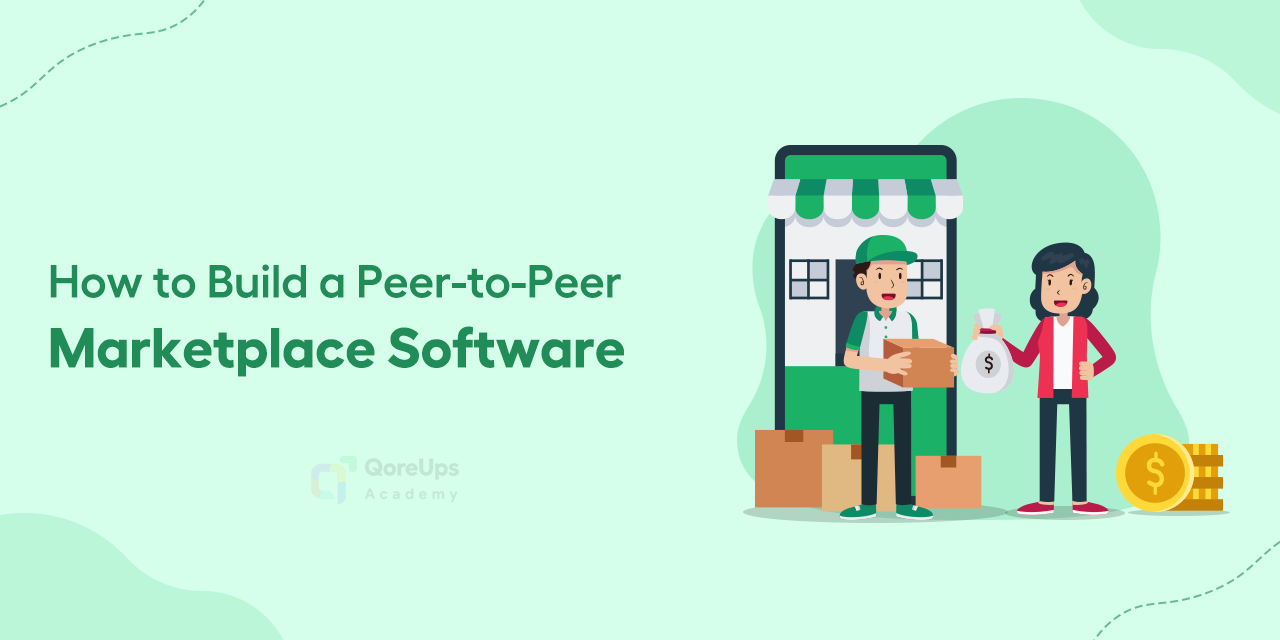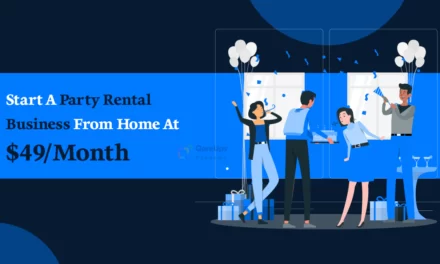Peer-to-peer (P2P) marketplace software has become one of the most dynamic models in the world of digital business.
From Amazon Marketplace to Taskrabbit, these platforms have revolutionized the way people share goods and services globally.
The best part?
You can build your own P2P marketplace software too. This industry presents immense potential for growth and success.
In this post, we’ll take you through the essentials of how to build peer to peer marketplace software, dive into the advantages, and much more.
No more waiting; let’s dive right in…
What is P2P Marketplace Software?
In simple terms, P2P marketplace software is the engine that powers platforms where individuals can buy, sell, or rent goods and services directly from each other.
Unlike traditional businesses that control the inventory, pricing, and transactions, P2P platforms enable users to interact with one another, creating a more decentralized exchange.
Think about how Airbnb lets homeowners rent out their properties or how Uber allows car owners to become drivers.
Essentially, it’s a matchmaking system for buyers and sellers, but with a lot of back-end tech working hard to make sure everything runs smoothly.
Advantages of Building a P2P Marketplace Software
According to Future Market Insights’ Report, “The peer-to-peer (p2p) marketplace market is predicted to rise at a CAGR of 18.7% from 2024 to 2034. The global peer-to-peer (p2p) marketplace is anticipated to reach USD 8,474.8 million by 2034.”
Let’s explore the unique advantages of building a P2P marketplace software:
1. Lower Overheads
One of the most attractive aspects of building a P2P marketplace is the cost savings on inventory management and warehousing.
In a traditional business, you have to buy products, store them, and manage logistics.
With P2P, sellers handle their own inventory, which reduces your operational costs drastically.
You can just focus on improving user experience and expanding the platform while users manage the inventory themselves.
Fact: Did you know that Airbnb started in 2008 with just three air mattresses in a San Francisco apartment? Today, the platform, which connects travelers with accommodations worldwide, is valued at over $100 billion—showing just how much can be achieved without inventory!
2. Scalable Growth
As a P2P marketplace, scalability is in your DNA.
Adding new users, products, and services to your platform is much easier than for traditional businesses.
Whether you’re starting small or have a vision to grow globally, your software should be capable of handling more transactions, services, and users without a hitch.
Think about Uber—a service that started in San Francisco and is now available in over 60 countries. This scalability wasn’t an accident. Uber’s tech team built a platform capable of handling a growing number of riders and drivers in multiple regions.
3. Increased Flexibility
Peer to peer rental marketplace software is versatile and adaptable.
It can cater to so many industries!
Whether you’re thinking about offering peer-to-peer rentals, services, or even experiences, your platform can evolve.
You might start with one niche market and later branch out to other verticals, allowing for endless opportunities.
Did You Know? Platforms like TaskRabbit—which started with local errands—expanded their services globally to encompass all sorts of odd jobs from furniture assembly to pet-sitting. The key was their flexible approach to new services!
4. Global Reach
In today’s world, geography is no longer a limitation.
P2P platforms, especially digital ones, have the power to connect people from across the world.
Your marketplace can be global from day one.
With a solid infrastructure, you can serve users from different countries, providing services or products with minimal barriers.
5. Enhanced Trust
Trust is at the core of every successful P2P platform.
Since users are transacting with strangers, the peer rating and review system helps ensure transparency.
Positive feedback builds credibility.
And negative reviews act as a warning system.
This layer of trust is what allows strangers to interact securely without feeling like they’re taking huge risks.
And a study by G2 Crowd revealed that 92% of B2B buyers are more likely to purchase after reading a trusted review.
Platforms like Airbnb have managed to overcome the initial ‘stranger danger’ aspect by implementing robust identity verification and rating systems that create a strong sense of trust among users.
Difference Between P2P, B2B, and C2C Marketplaces
Before jumping straight into the development phase of your P2P marketplace, it’s important to understand the differences between P2P and other types of online marketplaces:
Factors to Be Considered While Building a P2P Marketplace Software
Now, let’s talk about some key factors you need to consider when developing your P2P marketplace software:
- Target Audience: Who will be using your platform? Knowing your users and their needs will guide you in designing a user-friendly and engaging platform.
- Payment Integration: Seamless payment processing is critical in a P2P marketplace. Whether you integrate PayPal, Stripe, or another solution, make sure payments are safe for both parties.
- Security: P2P marketplaces handle sensitive data. Robust security measures like SSL encryption and fraud protection are a must.
- Mobile Optimization: More people are using smartphones to shop and share services than ever before. Your platform should offer a mobile-friendly design that looks just as good on a phone as it does on a desktop.
How Much Does It Cost to Build a P2P Marketplace Software?
Building a peer to peer marketplace software is a costly investment. But the good thing is that it can pay off big time. If you want an affordable option, there is a solution available in the market. Let’s discuss:
Custom Development Model:
- Basic Marketplace: If you’re looking for a simple platform with essential features like payment processing and user profiles, it can cost anywhere from $10,000 to $30,000.
- Advanced Marketplace: For more complex features like real-time chat, customizable product listings, or advanced search filters, the cost could range from $50,000 to $100,000 or more.
Subscription-Based Model:
Custom development can easily cost tens of thousands of dollars upfront. Especially if you need advanced features and a highly tailored platform.
But with a subscription-based marketplace alternative, you typically pay a monthly or annual fee, which significantly lowers your initial investment.
This model is especially helpful for entrepreneurs who are just starting and want to test the market without a large financial commitment.
It’s inexpensive, yet the functionality is of top quality:
Additional benefits include:
- lower initial costs
- all-in-one packages
- scalability at a fixed cost
- no development team required
- continuous tech updates and support
These are the costs you can expect to invest in building your P2P marketplace software. If you’ve a larger investment plan, choosing a custom development model is the right choice. Alternatively, if you want to get started without a hefty initial investment, the subscription-based model is an excellent option.
How to Choose a Marketplace Builder to Build P2P Marketplace Software?
Choosing the right marketplace builder is crucial to the success of your P2P marketplace. Below are the aspects you must look for when choosing a builder:
1. Customization Options
When building a peer to peer marketplace software, your business needs might be unique.
Whether you’re focusing on a specific niche, a local market, or global users, you’ll want a builder that allows you to customize the features and design to suit your specific needs.
Look for a marketplace builder that offers flexibility in features such as customizable user profiles, payment gateways, and tailored branding options.
Why does it matter?
Customization ensures that your marketplace stands out and meets the expectations of your users. You don’t want to use a “one-size-fits-all” solution when you have unique business goals. And a survey by Salesforce found that 87% of B2B buyers expect companies to provide a personalized and convenient purchasing experience.
2. Scalability
Your P2P marketplace will likely grow over time. So you’ll need a platform that can scale with your business.
Check for scalability features like cloud hosting, high server capacity, and the ability to upgrade or add new functionality without disrupting the user experience.
As your user base expands, your platform should be able to handle increased demand without crashing or slowing down.
Why does it matter?
As your marketplace grows, you don’t want to be stuck with a platform that can’t keep up. Scalability ensures that your marketplace can evolve to perform well as more users and services are added.
3. User-Friendly Interface
Your marketplace needs to be easy to navigate for users—whether they’re buyers or sellers.
The success of your platform depends on the ease of use.
If the interface is complicated or hard to navigate, users may get frustrated and leave.
Therefore, look for a marketplace builder that offers intuitive design and a simple user experience (UX). And the marketplace should be easy to use on both desktop and mobile devices.
Why does it matter?
If users can’t figure out how to use your platform quickly, they won’t stick around. A user-friendly interface improves user retention rates and makes it more likely that they will return and recommend to others.
4. Security Features
Security is crucial when building a P2P marketplace.
You need to choose a marketplace builder that offers strong security measures to protect your platform and users’ data.
Check twice for features like:
- SSL encryption
- fraud detection tools
- data privacy protocols
- secure payment gateways
Why does it matter?
First, users need to trust your platform to initiate transactions. A secure platform provides just that and helps protect sensitive information, builds credibility, and reduces the risk of security breaches or fraud.
5. Support & Updates
Building a peer to peer marketplace software isn’t a “set it and forget it” endeavor.
You’ll need reliable support and regular software updates to keep your platform running smoothly.
Therefore, choose a builder who can provide:
- 24/7 support team
- a clear roadmap for future updates
This way, you’re not left in the lurch when problems arise.
Why does it matter?
Ongoing support and updates are vital for fixing bugs, adding new features, and keeping your marketplace secure. With good support, you can troubleshoot problems faster and keep your platform running without interruptions.
Why Choose QoreUps to Build the Best P2P Marketplace Software?
QoreUps is a leading one-stop B2B SaaS platform that helps you build the best marketplace quickly and affordably. Plus, it offers all the benefits you need to run your marketplace successfully, such as:
- The peer to peer marketplace software is customized to meet the specific needs of your business.
- Cutting-edge security features are designed to safeguard your business’s data.
- The software retains the ability to grow and adapt with your business as it expands.
- QoreUps maintains your platform, so you can just focus on growing your business.
- The software builder always ensures your marketplace is updated with the latest features and functionalities.
QuoreUps is the right builder that can help build a P2P marketplace platform that can grow with your business, meet your users’ needs, and remain secure, functional, and successful over time.
Conclusion
Building peer to peer marketplace software can be a game-changer in today’s fast-paced digital economy.
By offering lower overheads, scalable growth, flexibility, a global reach, and trust-building systems, P2P marketplaces provide huge advantages for both business owners and users.
So, whether you’re just starting or looking to improve an existing platform, these benefits will guide you toward creating something successful.
And with the assistance of the right partner like QoreUps, you can be confident your marketplace will not only be innovative and secure but also scalable and ready for the future.






